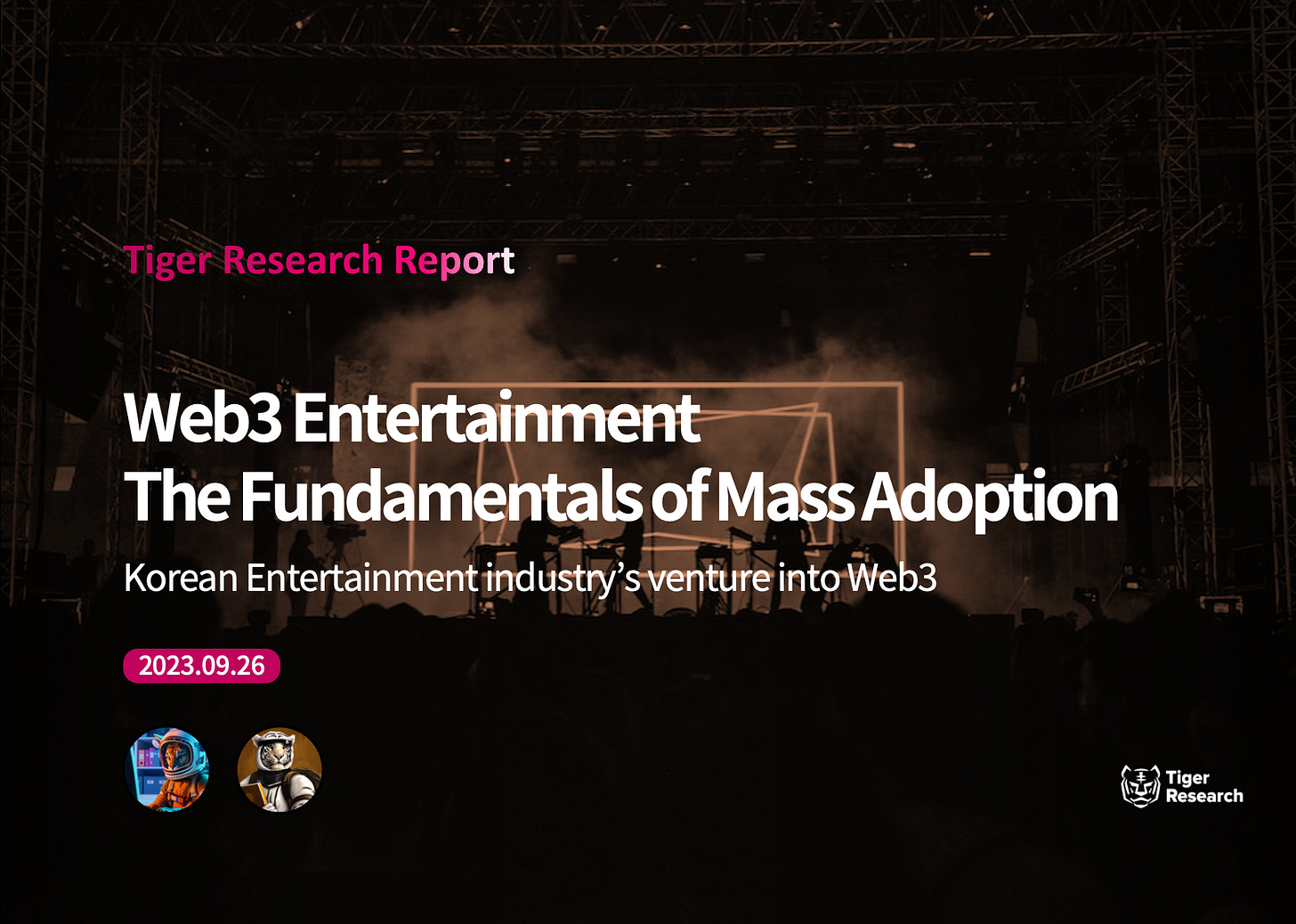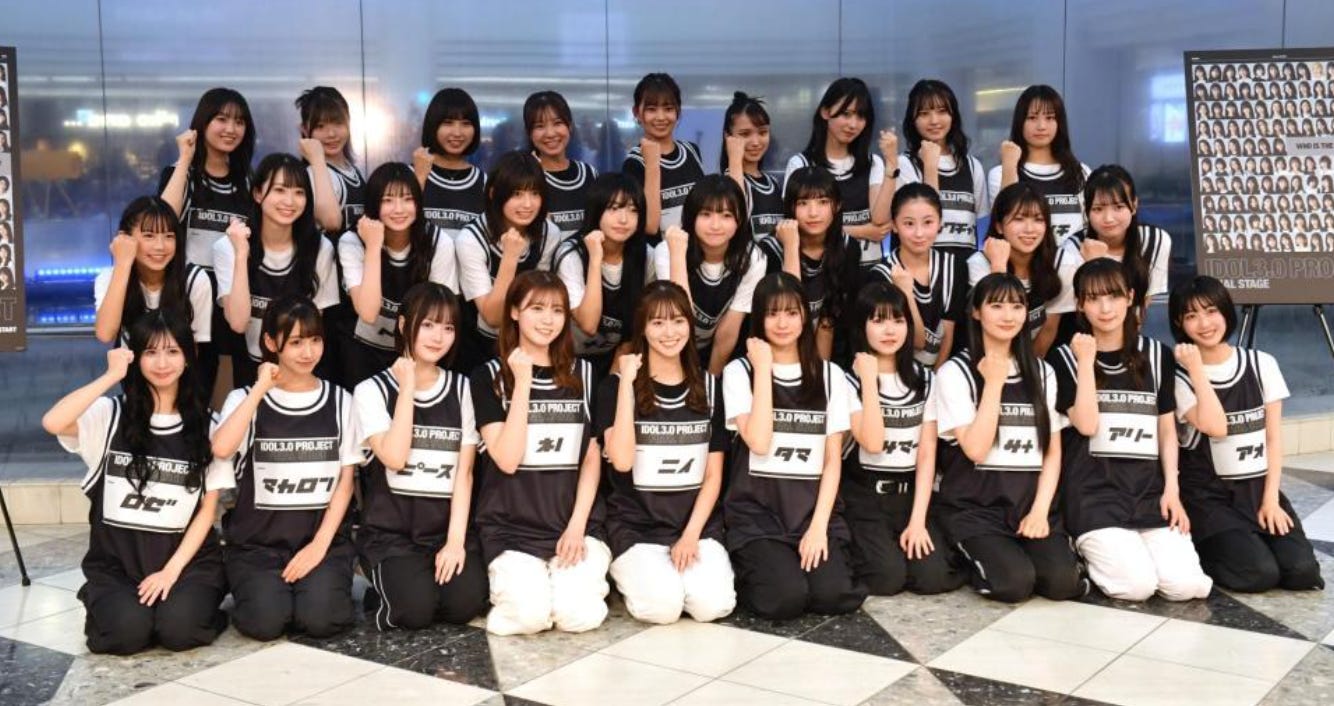
Web3 Entertainment, the fundamentals of mass adoption
Korean entertainment industry's venture into Web3
TL;DR
The Korean entertainment industry is expected to lead web3 mass adoption based on its large fandom culture, and many entertainment companies are already entering the web3 market.
While large domestic entertainment companies are mainly striving to secure technological expertise first by conducting R&D into blockchain technology or investing in blockchain companies, small and medium-sized entertainment companies are taking more aggressive steps to improve their immediate performance by directly launching web3 projects utilizing their artist IP.
As such, entertainment companies are actively entering the web3 market, but there are tangible results as of yet. This may be due to the fact that blockchain technology is still not consumer-friendly, and the web3 industry’s tendencies to focus on emphasizing the technical and decentralized aspects rather than the actual utility of their business models.
Introduction
The entertainment industry is never not mentioned when talking about the mass adoption of blockchain technology, largely thanks to its fandom culture. This is because the entertainment industry is expected to play a catalytic role in attracting the general public with the intrinsic value of 'fun' and lowering the entry barrier to the web3 market. In particular, as a cultural content powerhouse with a highly developed entertainment industry, South Korea is expected to create explosive synergies with web3 values.
Traditional entertainment companies enters the Web3 market
As per expectation, the traditional Korean entertainment industry is actively entering the Web3 market. The so-called Big 4 Korean entertainment companies, (HYBE, SM, YG, and JYP), have been making cautious efforts to prioritize their technological expertise by conducting preliminary research and development related to blockchain technology or investing in and partnering with blockchain companies. Small and medium-sized entertainment companies, on the other hand, are taking more aggressive measures, such as launching a number of web3 projects utilizing their artist IP to improve their immediate performance.
The reason behind their entry
There are various reasons for the companies’ entry into the web3 market, but the coronavirus pandemic is expected to be the biggest catalyst. After the pandemic, offline-centered business models such as concerts were severely affected, and the need for digital transformation became more prominent. In this process, Web3 technology began to emerge as a key element for new business models, and a number of entertainment companies began to actively research blockchain technology and apply it to their actual businesses.
The trend of entertainment companies entering the web3 space is expected to grow stronger. First, new business opportunities will be created by incorporating blockchain technology. Entertainment companies have been including physical photo cards in their albums to make them desirable as collectibles for fans, which in turn leads to purchases. In 2022 alone, sales of K-pop albums are expected to reach 80 million copies, showing a frenzied consumption. However, recently the Korea Fair Trade Commission (KFTC) has begun to investigate the sale of music albums under suspicion of unfair trade practices. With the sales of music albums under scrutiny, the entertainment industry is expected to explore new sources of revenue by incorporating NFT technology into artist IP merchandise, such as photo cards and music, to overcome this hurdle.
Second, web3 technology can complement existing business models. The entertainment industry has a high-risk business model with a short PLC (Product Life Cycle). In particular, NFT and token issuance will be used for liquidity and risk mitigation, as building new idol groups is very capital-intensive. It takes at least two years for an idol group to debut and costs an average of USD 1.5M. Furthermore, the probability of their successful debut is only 0.1%. Therefore, entertainment companies are expected to actively adopt business models that utilize web3 to diversify their business and secure stable funding.
Application of Web3 technologies in entertainment
For web3-related entertainment projects, we see two main use cases. The first is the simple integration of blockchain technology into existing business models. Examples are using NFT technology to produce limited edition digital goods, or monetizing artist IP by issuing NFTs. These models exploded with the popularity of the NFT market, but since the NFT market downturn, most of them have either disappeared or suffered a steady decline in price.
Second, we see models that actively utilize Web3 technologies, such as engaging fans through a token-based governance structure. This is a structure that allows fans to directly vote on decisions related to artist operations, and operates similarly to a DAO. For example, at Modhouse, which manages the idol group Triple S, fans purchase NFT photo cards that give them corresponding voting rights. Through this, fans can participate in decisions related to the group's operations, such as the name of the fandom and deciding which songs will be listed on an album. Recently, projects that utilize token-based governance to participate in the idol selection process have also emerged in Japan. Similar models are expected to appear more frequently in the future.
Limitations of Web3 entertainment
Despite these developments, the entertainment industry is still struggling to find a breakthrough. Artist NFT platform operator ‘Levvels’, a joint venture between Dunamu and Hybe, recorded a deficit of about 10 billion won in 2022, and FNC Entertainment's NFT platform ‘Moment of Artist’ quietly disappeared altogether. In fact, most artist-related NFT projects have been underperforming overall, with prices continuing to decline.
There are a number of factors contributing to the underperformance of Web3 entertainment:
The fandom, a key stakeholder in the entertainment industry, has a strong negative perception of Web3 technology adoption. This is likely to have been exacerbated by the conflict between many investors and existing fandoms in the early days of Web3 technology adoption in entertainment. In addition, the use of NFT technology in the entertainment industry is associated with artist-related benefits, so fans who are resistant to a system that favors certain fans (buyers) are inherently opposed to it.
There is a lack of tangible benefits from using Web3 technologies. The entertainment industry is heavily centered around offline elements. Thus, offline experiences are still more appealing than digital ones. The use of Web3 technologies, which is almost entirely an online affair, has not been able to capture fans’ attention to date.
It's hard to reach a consensus among the stakeholders in the entertainment industry. The entertainment industry is a complex web of relationships among many different stakeholders, including agencies, artists, and fans, making it difficult for new initiatives to succeed. This is mainly due to the different interests and priorities of each stakeholder failing to align. For example, in the case of issuing NFT tickets for idol concerts, the involved stakeholders include entertainment companies, performance agencies, artists, fandoms, ticket distributors, and government regulations. Reaching a consensus regarding a new business among these different stakeholders will take a long time, if at all.
Conclusion
The entertainment industry is expected to lead the way in popularizing Web3 with its strong fandom culture. However, as of the moment the future is yet unclear as no project has shown tangible results. This is due to the fact that blockchain technology has not been consumer-friendly, emphasizing technological decentralization rather than providing practical benefits to the public.
Nevertheless, there are still ongoing attempts to advance the adoption of Web3 in the entertainment industry. If the aforementioned issues can be resolved, the combination of web3 and entertainment is expected to produce positive synergies. The introduction of blockchain technology in the entertainment industry is expected to solve its longstanding problems, such as 1) low revenue generation compared to IP value, and 2) the empowerment of fans by recognition of their participation in the fandom as part of a self-sustaining ecosystem. For these reasons, it is expected that various players in the entertainment industry will continue to make efforts to actively incorporate Web3 into the entertainment industry.
Participate in our 1-minute survey to help improve our weekly reports. As a thank you, you can download Tiger Research's original "2023 Country Crypto Matrix" spreadsheet, an all-in-one spreadsheet for the global virtual asset market analysis after finishing the survey.












